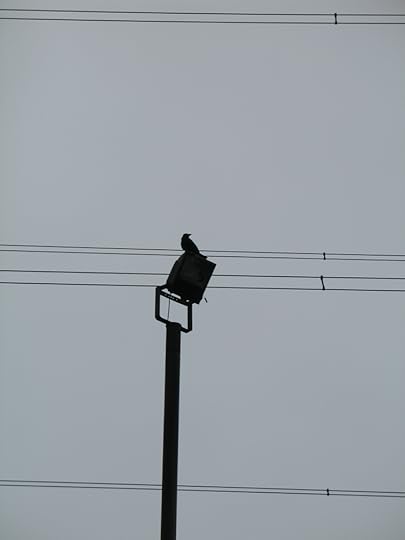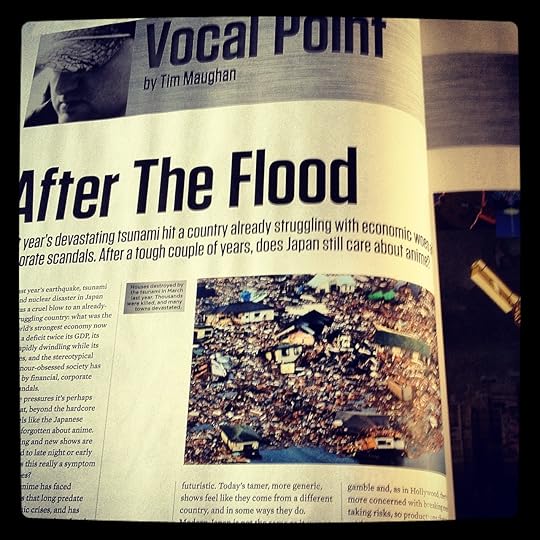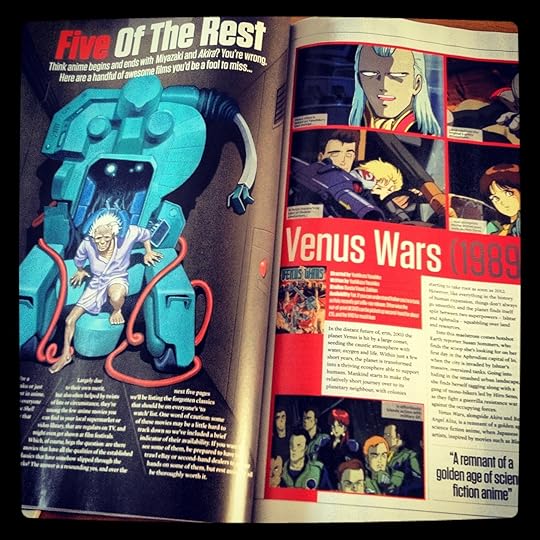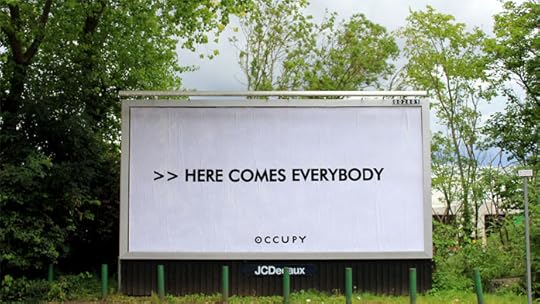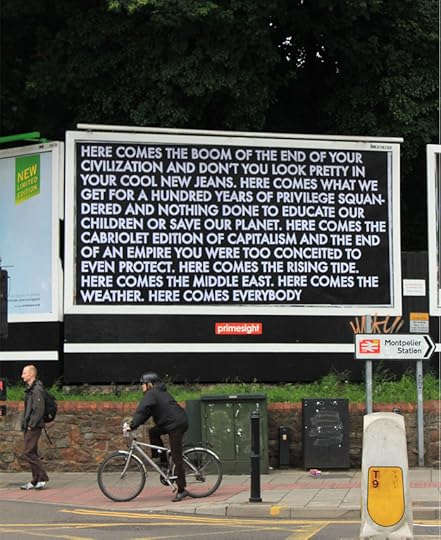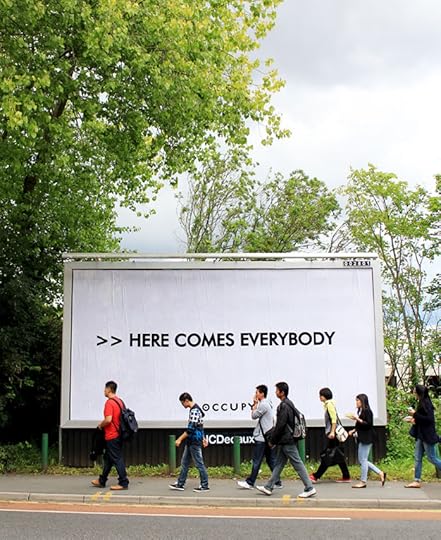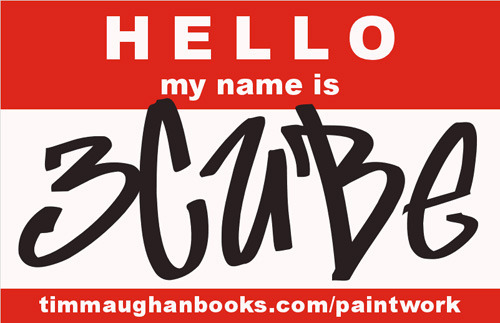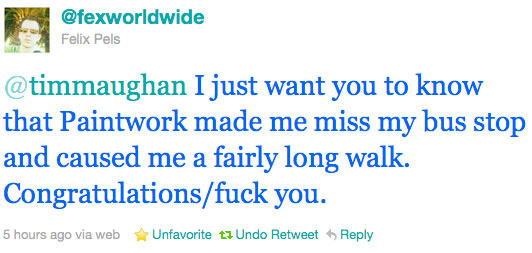Tim Maughan's Blog, page 3
October 9, 2012
Review: Ginger and Rosa (2012)
Ginger and Rosa, directed by Sally Potter (Orlando, Yes) is an intense coming of age drama centred around the two eponymous heroines – although in effect it’s very much just Ginger’s story. The teenager daughter of two painfully bourgeoise bohemians – a pacifist philosopher and a failed artist-turned-housewife, we follow ginger through 1960s London as she comes to terms with her family, her friends and her increasing fear and paranoia about nuclear war and her subsequent involvement in CND.
The main problem Ginger and Rosa faces is, as a character study, is that none of the characters – Ginger included at times – really seem that interesting or empathetic. For a start everyone is so numbingly, stiflingly upper class – in fact Potter’s swinging sixties London seems to be utterly bourgeois, there’s no hint of deviance from this anywhere. Combined with some at times terribly clunky dialogue, meant to remind us that these people are intellectuals and that it’s the 1960s (“Are you not worried about the crisis?” “What crisis?” “With the missiles in Cuba!”), I struggled to find myself really caring about anyone by the third act, as it threatened to descend into stiff upper-lip melodrama. Similarly the bizarre decision to use American actors for British roles too frequently jars you out of belief suspension – Elle Fanning just about holds the accent together, but poor Christina Hendricks really doesn’t, which is a tragedy as the rest of her performance feels note perfect, and her role as Ginger’s mother is by far the most potentially interesting and sympathetic character. It’s an even stranger choice when Annette Bening and Oliver Platt get to keep their own accents by playing inexplicably American characters.
All of which is a huge shame, as the premise itself is interesting – especially Ginger’s obsession with nuclear holocaust as a metaphor for her own family and emotional crisis. And the movie is fantastic to look at – Potter and cinematographer Robbie Ryan clearly having a brilliant eye for lighting and mood; London feeling both wide-open and claustrophobic in turns, an urban wasteland still reeling from the destruction of the war. In fact the city is by far Ginger and Rosa’s most interesting character and performer, and almost makes the movie worth seeing on its own.
This review was based on a press screening at the Watershed, Bristol. The movie is playing there – and nationwide – from Friday 19th October.

October 5, 2012
A nowhere place: images of Limited Edition
One thing I always do when I start a new writing project – if possible – is go out and take some reference photos. I usually don’t actually use them that specifically – I rarely describe something featured in the pictures in precise detail – but I do find having them to hand, or even the act of taking them, helps me build atmosphere when writing. At least it does usually; it’s not a precise science by any means.
Anyway, it was one of the first things I did when writing my story Limited Edition for Arc magazine. Most of the action takes place around Avonmeads Retail Park, a very real place in south Bristol, just a few minutes walk from where I live. It’s easiest if I let Grids, Limited Edition’s main protagonist, explain how he feels about it:
“Avonmeads Retail Park, sandwiched between train tracks and a muddy river, half-hidden under the concrete sprawl of the traffic filled St Philips Causeway fly-over, looks out of place amongst the grid of infrastructure and housing, like a scrap of unwanted paper – like a discarded burger wrapper – that’s been blown on to this huge rolled out map, or a crumpled note pinned in place with electricity pylons and aerials. A nowhere-zone studded with near-forgotten retail brands and fast food franchises, a glorified car park that would have been abandoned to the rats and seagulls if you could download coffee, fried chicken and cheap household goods straight off the timelines.
Avonmeads is less than ten minutes walk from Barton Hill, from his ends, but it feels like a different world to him. Whenever there’s any trouble with youth in places like this the timelines erupt with opinions, people angry and shouting, saying why are people like him making trouble and tearing up their own community. He shakes his head and laughs to himself. Community? There’s no community down here. This isn’t a community space – it’s nowhere, a non-place. Nobody lives here, it’s populated only fleetingly by transient visitors – van drivers getting lunch, shoppers buying the few things they still can’t buy through their spex or print at home. Even the staff in the shops here – none of them live here, they just come for a few hours a day, a few days a week. And most of them don’t even hold that down for long – there’s about as much a sense of career down here as there is community. For a start the shops never stay for long – something opens, fills a short term need, then closes. Storefronts lie dead and abandoned, until someone thinks they’ve found another fleeting need, moves in, shuts down. Open, close, repeat.
No, the only thing that matters here is cash flow. It flows in and it flows out – in huge armoured, aerial-drone tracked, security vans. And that’s all it does. Nobody lives here, nobody works here for long, and the money doesn’t stick around – Grids ain’t no sociologist, but he’s pretty sure that’s not how a community is meant to work. And even if it is then he’s still not part of it, because he’s got no cash. Never has. And down here that makes him irrelevant, an outsider. It makes him insignificant.”
Don’t be misled though – that’s not exactly how I feel about Avonmeads. Sure there’s an element of my feelings in there – the part of me that finds consumer capitalism hollow and dangerous – but I always think it’s too easy for those of us with a little middle class privilege to dismiss the mass-culture of retail parks, multiplex cinemas, supermarkets and fast food chains out of hand. It’s a hypocritical, misguided nostalgia for a time when when everything was less uniform, more bespoke while most of us benefit from the cozy life that mass produced (post)industrial society gives us. The honest truth is that there’s not enough organic food to feed the population, not enough local butchers for everyone to shop in and not enough pre-war art deco cinemas for us all to take our families to. You can go to those places if you want – I certainly do on occasion – but don’t let yourself feel better than anyone just because you do. You’re not. You’re not really challenging anything about the status quo, and you end up just creating an artificial barrier between yourself and ‘the masses’, and run the risk of smugly flaunting your privilege.
Plus, I can’t deny I enjoy the slightly dystopian – or, to coin an overused phrase, Ballardian – vibe that Avonmeads gives me when I stroll around there. Maybe some of that comes out in the photos below. Have a look and tell me what you think. I’m off down to Avonmeads right now, to catch a movie and a burger.
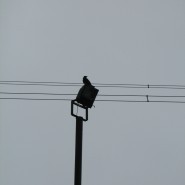






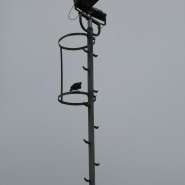
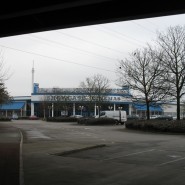






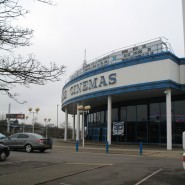





September 28, 2012
Limited Edition – new fiction for New Scientist’s Arc 1.3
Earlier this year I was asked by Simon Ings – one of my favourite novelists – to write a new short story for Arc magazine. If you don’t know Arc then you really should – it’s a quarterly mix of fiction and essays about the future published by none other than New Scientist. My first reaction was to be hugely flattered, followed swiftly by being terrified – I mean for drokk’s sake go and look at the list of previous contributors. Big names. Scary.
So after I’d pulled myself together I got down to actually writing something. The result was Limited Edition; an attempt to see if I could use science fiction to make some sense of the riots and looting that erupted across the UK’s cities last summer. I’m still not sure that I managed that at all, but I did end up with this Bristol based story of edge-land retail parks, limited edition sneakers, bored teenagers, DIY drones, rabid consumerism and the gamification of looting. Hopefully, even if it doesn’t provide any answers or explanations, it’s still a fun read.
Anyway, you can find out for yourself today. The magazine is out now on a bunch of digital platforms, and if you’re quick it won’t cost you a single penny – it’s a free download for a limited time only. Or you can even order a printed copy. I won’t hesitate to recommend it – not on the basis of my story, but the rest of the content. There’s some great fiction from the likes of Lavie Tidhar and Nan Craig in there, as well as essays from clever people like Paul Graham-Raven and Justin Pickard. Go grab it, and then come back here and tell me what you think.
(Oh, and the illustration above – also from the mag where it accompanies my story – is by the amazing artist Robert Carter – best known for his political and celebrity portraits for US magazines and newspapers. And it catches certain imagery from the story perfectly.)

Future heckling opportunities
It’s one thing to be able to shout abuse at me on the networks, but how about doing it in person? Well, if you are in Bristol this October they’ll be plentiful (three) opportunities to do just that. Come and see me speak nonsense and read from Paintwork (and maybe some new stuff) at the following events:
Wednesday 3rd October – Word of Mouth at the Thunderbolt, Bristol, 8pm
I’ll be reading alongside science fiction author Gareth L Powell. The Thunderbolt is a great pub and kind of my local (well – it’s the closest pub to here I’m not scared to go in to be honest), so come and buy me a pint.
Friday 12th October – Swords and Stars at Waterstones, The Galleries, Bristol, 6pm
This should be a great event showcasing local genre writers – me and Gareth again alongside the great Emma Newman and Jonathon Howard for a panel/Q&A style discussion.
Saturday 20th October – Bristolcon, all day
The country’s greatest one day con returns, with a killer line up of guests. I’ll be there doing the panel thing and probably some reading – more details when I have them.
I’ll be signing books and body parts at all the above events, as well as selling copies of Paintwork. So for drokk’s sake bring some cash with you. Or drugs. See you there!

September 17, 2012
Save the Tape Ops
The BBC has an interesting piece on a new report on online music piracy in the UK that claims to give data on demographics and geography, and where we can learn all sorts of shocking revelations like that the best selling artists are the most pirated, and that middle class teenage girls in Oxfordshire villages like Justin Beiber. Groundbreaking stuff, even if the reality of being able to monitor illegal downloads is nowhere near as cut and dried as the report seems to suggest.
But anyway. What really caught my eye were the comments from the British Phonographic Institute CEO Geoff Taylor. He says piracy has an impact on everyone that works in the industry.
“It’s on session musicians who play in the studio; it’s on the engineers and tape ops in the studio..”
Whoa. Reel back a bit for me there. Tape ops? Do you mean tape operators? Are you saying that modern pop music recording studios are still using tape, and employing dedicated staff just to operate it?
I’ve no idea when Geoff Taylor was last in a recording studio, but I’m guessing it was some point in the 90s based on this. As far as I understand it – and I’m happy to be corrected – multitrack recording is all done digitally now on computers, and sadly the tape operator has gone the way of the dodo.
To be fair, in a way Mr Taylor does have a point. This new dark age of computing has hit the likes of tape operators hard. Non-linear recording, cheap software/hardware and automation have quite simply made them redundant. This is the unavoidable truth about music technology. Music technology that the music industry has adopted whole heartedly for the costs it can cut. Costs it can cut by not employing people like tape operators.
Look – don’t get me wrong – music piracy is a serious issue, and requires a serious debate. It just disturbs me – although sadly it fails to surprise me – when those involved on the industry side seem to be permanently stuck in the past. I’ve talked about piracy elsewhere on this site, and about how I believe the main driving force behind it has been decades of over-commodification of music and artists. I’d like to hear Mr Taylor’s views on that, though I’m pretty sure he’d dismiss it out of hand. Especially as he’s not just concerned about ‘tape ops’:
“…it’s on the guys working in a PR company trying to get coverage; it’s on the marketing department; the guys in legal who are doing the contracts.”
Ah, ok. So that’s all the industry people that have nothing to do with the making or producing the music themselves, whose main role is to keep themselves in employment by pushing forward that never-ending commodification? Yeah, I’d hate to see them be impacted.

August 2, 2012
Science Fiction Is Here, It’s Just Not Evenly Distributed – SF and Class
Science fiction author Lavie Tidhar recently asked me to write a guest post on SF and class for his excellent World SF Blog, and the result went live this week. It’s a ranty little piece, but hopefully it maks some salient points – primarily that SF is middle class construct, and as such faces the same crisis that the western middle class faces in the 21st century:
“Any crisis of identity or confidence for the middle classes is also – undeniably – a crisis for science fiction. Science fiction is one of the great middle class cultural projects; an exciting, upmarket gated community where you need to show your credentials to get admittance. You’re allowed into science fiction because you understand the greatest middle class-empowering construct of the last 200 years – you understand science. You are welcome in science fiction because you understand that scientists and engineers and astronauts are heroes. You are welcome in science fiction because you understand that rationality and reasoning and hard work can fix anything. And most importantly, you are welcome in science fiction because you’re middle class and you understand that the future is yours for the taking.
And that is the biggest problem facing science fiction right now. The future isn’t just sitting there waiting for the middle classes to take it anymore (well, at least not the middle classes in Europe and North America – it’s very likely the future is up for grabs for the growing middle classes in China, India, Brazil and elsewhere – but that’s another, potentially far more exciting story). If the future is just a bunch of very scary questions, rather than something that belongs to the middle classes and makes them feel special than what’s the point of reading – or even writing – about it anymore?”
Thanks to everyone that’s checked it out already, and thanks to Lavie for asking me to write it. Head over there and give it a read, and tell me where I’m wrong in the post’s comments.

July 27, 2012
The SFX Ultimate Guide to Anime
If you live in the UK the chances are you’ve heard of SFX Magazine, the country’s most popular science fiction and fantasy mag, covering books, movies, games and all that stuff. This week saw the release of their annual anime special, which I was lucky enough to be asked to contribute to. In fact I’ve got three articles in the magazine, kicking off with an opinion piece on the state of anime in Japan following the 2011 earthquake.
Next up is a piece on simulcasts and legal streaming services, including five shows from the Spring 2012 season that are worth checking out.
And finally there’s a selection of five forgotten classics – essential anime OVAs and movies that you might have missed or have faded into obscurity.
But it’s not just me, obviously – the guide has some far more interesting articles from the likes of Helen McCarthy, Andrew Osmond and Guy Haley, plus a free DVD and some posters. You can pick it up now from must places that sell magazines in the UK (and some in the US and Canada, I understand) or buy it direct from the SFX website. There’s even a digital version for iPad and iPhone.

July 17, 2012
Paintwork and real life Bristol billboard art
Those of you that have read my book Paintwork will know that the title story is about re-purposing advertising billboards for art – in fact you might recall that I described pretty specifically the location of the billboards in question. They are real things, in a very real place. I walk past them everyday. That’s why I wrote that story – I felt I needed some way of striking back against the visual invasion of public space I’m subjected to every time I walk past there. Billboards are imposing enough when you see them from a passing bus or car, but the way they impose and dominate your reality – blocking out all other imagery – as you pass them as a pedestrian starts to grate pretty quickly.
So it was some surprise and delight this week that I passed one of the billboards – in fact the very one that is first mentioned in Paintwork – to find that someone had re-puposed it. Turns out it’s the work of billboard artist Robert Montgomery. From what I know of him he doesn’t seem to be based in Bristol and he’s done a few of these across the country, so it seems like a brilliant coincidence that he picked this board to do it it on, but i’m sure that’s all it is. Either way it’s made my walk to the day job slightly more bearable.
Photos stolen from Brandalism.

January 14, 2012
Paintwork – more reviews
My first post here in 2012 – meaning it's been about six months since Paintwork was first realeased. Madness. 2011 was a busy year for me – especially the second half – but it certainly doesn't feel like it's been that long.
Anyway, 2012 is here and Paintwork is still picking up some great reviews. Just this week Johann Carlisle pasted a wonderfully thoughtful and enthusisatic review over at the excellent Future Fire – one of my favourite SF 'zines:
"The themes that recur in this volume include the importance of the street: not only as a space in which to travel from one venue to another, but as a place where people live (in some cases literally under road junctions). As a place where identity is situated and explored, where culture evolves organically, often orthogonally to mainstream and commercial trends; where language is coined and invented; where lives are broken and grow. These are very sensitive stories, bubbling with language and emotion and artistry, warped by the digital and the human…As a collection, this 100-page book displays not only its author's mastery of writing science fiction, his love of urban culture, electronic music and gaming, but also his keen intellect and ability to build a story that is both entertaining and edifying at a single stroke. Very impressive stuff, and we should all look out for more cyberpunk fiction by Tim Maughan."
-The Future Fire (read full review)
And just in case you missed me bleating on about it before Christmas, Cory Doctorow (yes, that Cory Doctorow) posted another great review over at Boing Boing:
"In an era of "post-cyberpunk" science fiction, Maughan is firmly cyberpunk — or maybe "cyberpunk++," a genre that captures all the grit and glory of technology with a higher degree of plausibility and respect for real computers and networks than the genre had in its glory days…Maughan has a keen eye for the fictional possibilities of technology, a good hand with the what if/ten seconds in the future mode of storytelling, and he's quite adept at filling his work with hyper-cool eyeball kicks. These stories are fun and thought-provoking, a great combination."
- Cory Doctorow, author of Down and Out in the Magic Kingdom and Little Brother (read full review)
Paintwork is out now – you can get Kindle versions from Amazon US and Amazon UK, and versions for all other popular e-readers (including iPad and Nook) at Smashwords. Those of you that prefer to buy your eBooks from an independent store can grab it from The Wizard's Tower.
Print versions are also available from Createspace or Amazon US and Amazon UK.




